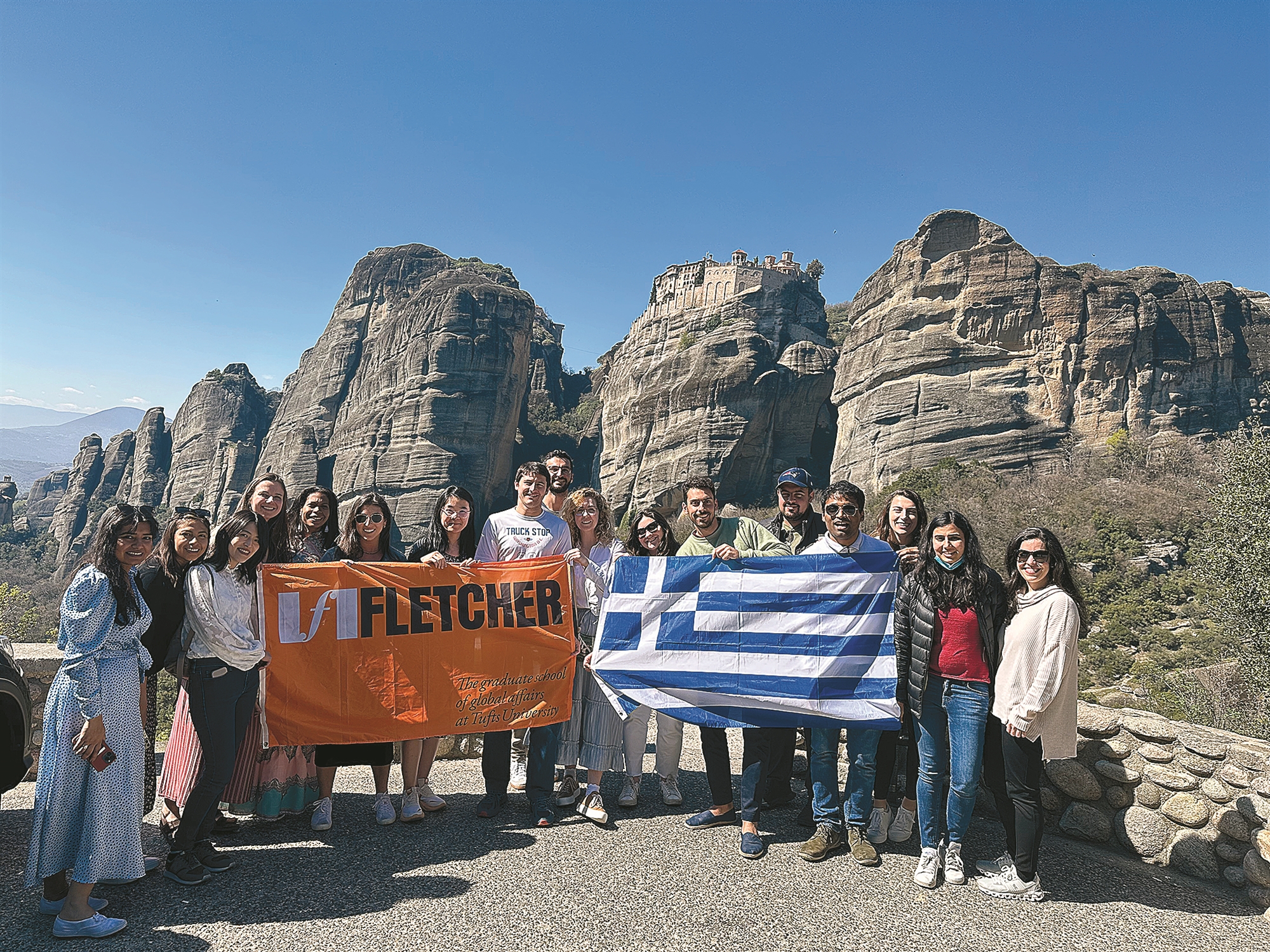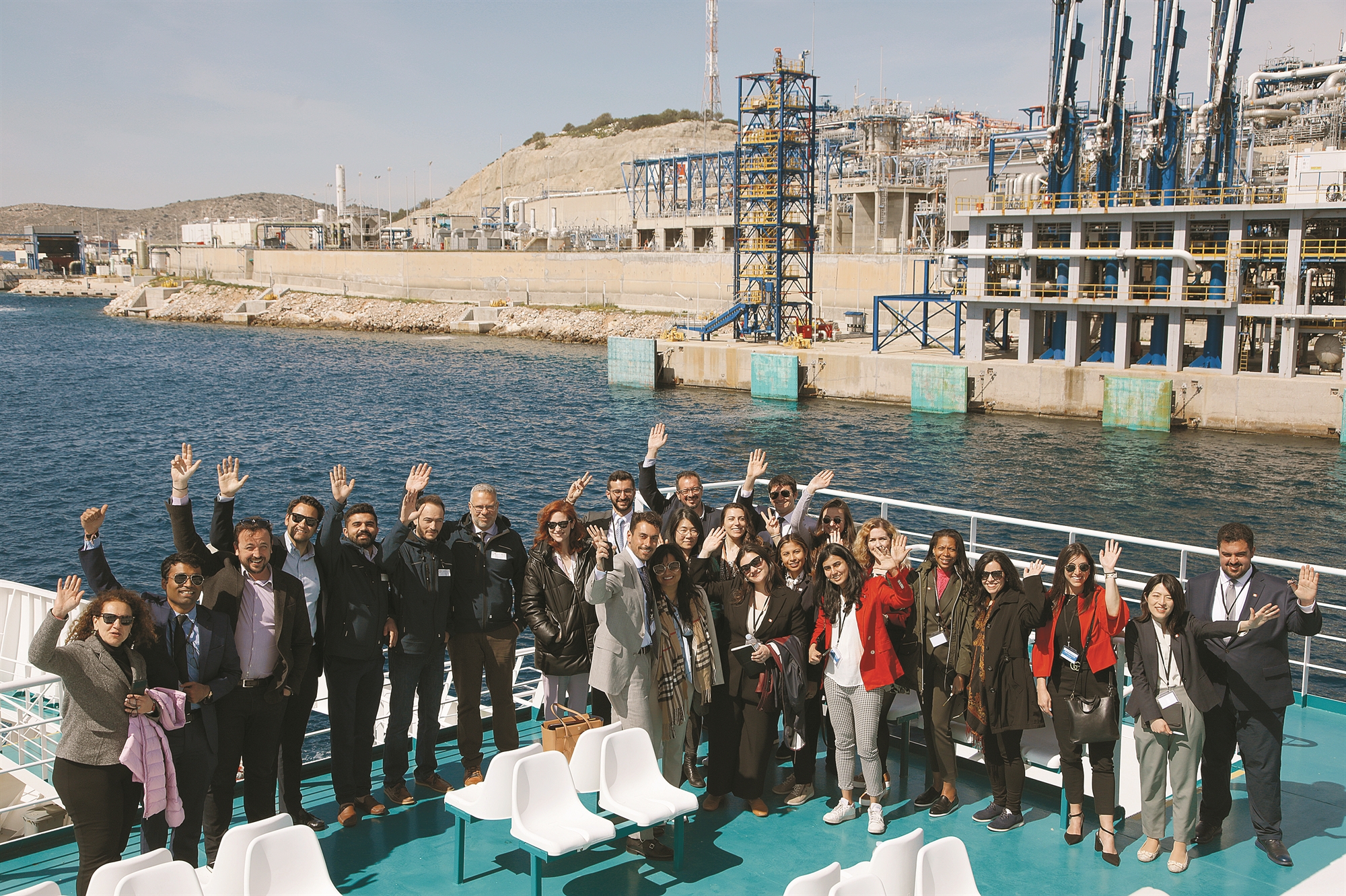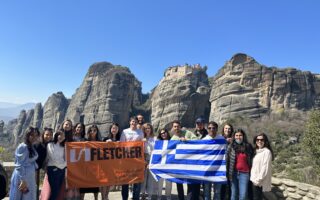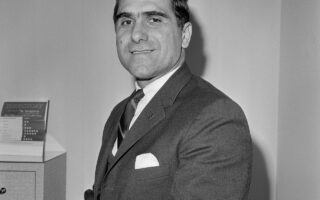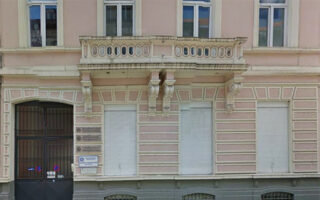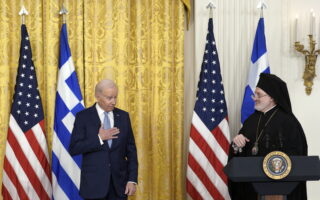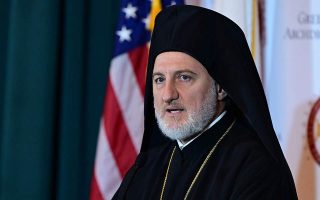Greek Trek: Investing in tomorrow’s philhellenes
Three Greek-American postgraduate students at Tufts have created an educational tour of the country that launched in March
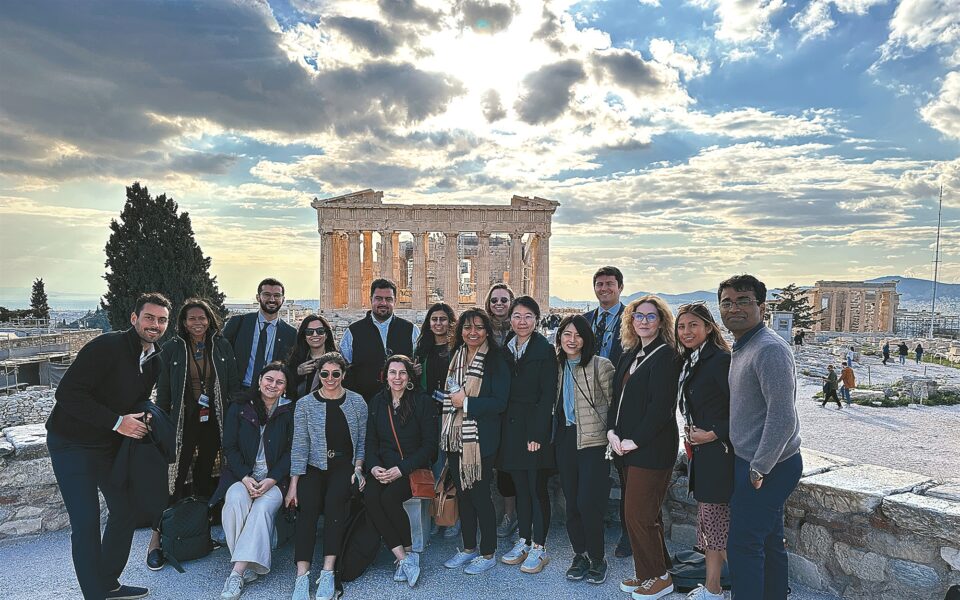
“My parents moved to Greece from a village in Northern Epirus (southern Albania) in the 1990s, with the dream of returning to their homeland and having fought to keep their Greek identity alive in Albania,” says Anastasia Thano, who was born in Athens. “However, in 2009, just before the debt crisis broke out, they decided to emigrate again, hoping for a better future for their children. So we left for the United States.”
Dimitris Papachristou’s roots go back to Kyriaki, a village in the regional unit of Viotia in Central Greece, on his father’s side, and to the southern island of Crete on his mother’s side. For professional reasons, the family spent many years in various countries in Europe. Konstantinos Angelakis’ grandparents came from Thessaloniki and Messinia. He himself is a second-generation Greek American.
The three met at the Fletcher School of Law and Diplomacy at Tufts University in Medford, Massachusetts, where they are pursuing graduate studies. They not only share Greek ancestry but also a deep love for Greece. “Yes, we love Greece, but that does not mean that we lack the clarity to understand it as a place of intense contradictions, where black and white coexist in almost everything. On the one hand, ancient glory, history, hospitality, the warmth of its people, and on the other, the inflexible state apparatus, the bureaucracy, the brain drain, and often corruption. Hopefully, we can contribute to making a positive difference,” Anastasia says.
The idea of making their own modest contribution emerged last summer in a small cafe in Plaka Lasithiou, a seaside village opposite the island of Spinalonga on Crete, where they were vacationing. There, drinking raki, they decided to take the initiative: to organize an educational trip, the “Greece Trek” as it was later called, so that their fellow students would have a chance to see “the real Greece behind the window, through authentic experiences that the average tourist finds it very difficult, if not impossible, to experience,” says Konstantinos. The university organizes several similar trips each year, mainly to Israel, Japan, Central Asia, and Colombia. However, it had never organized one to Greece.
The three classmates moved heaven and earth to make their idea come to life. They secured sponsorships by reaching out to well-off members of the Greek-American community and began planning their trip. Their key goal, they say, was to build bridges. “Tufts is one of the world’s leading universities in the field of international relations, political science and diplomacy, and its graduates are almost certain to occupy positions of power in governments, embassies, international organizations and multinational firms. By showing our classmates the best, the most dynamic part of our country, we are essentially investing in the future, in tomorrow’s philhellenes,” says Dimitris. “And because the average American understands Greece through the Acropolis-good food-economic crisis triptych, we wanted to break stereotypes, to enrich the knowledge of those participating in the Greece Trek and in other fields beyond Classical antiquity. How many people know, for example, the role that the 1821 War of Independence played in shaping the geopolitical map of Europe at that time? Or the excellent work that is being done in many fields of entrepreneurship and production? There is more than tourism…”
‘We love Greece, but that does not mean that we lack the clarity to understand it as a place of intense contradictions’
The 10-day program was created with the valuable help of Alexandra Tiligada and Sophia Antoniadou, co-founders of the company Discover Greek Culture. On March 18, a group of 17 students from the United States, India, Japan, Venezuela, Taiwan, Mexico and Kuwait arrived in Greece. Emphasis was placed on culture, with visits to museums, archaeological sites, and modern monuments, from the Acropolis, Mycenae and the island of Aegina to Meteora, among others. Representatives of the generation that will shape the world of tomorrow met with government officials and entrepreneurs, gaining insights into various aspects of Greek reality that concern foreign policy, the economy, investments, energy, the refugee crisis and human rights.
They visited, for example, the liquefied natural gas terminal on the islet of Revithoussa, 45 kilometers west of Athens, to see how Greek gas grid operator DESFA is strengthening one of the country’s most important energy infrastructures to effectively meet both current and future energy needs. After being shown around by Fernando Kalligas, DESFA director of corporate affairs, they expressed interest in the regulations that ensure the safety of workers on the island, the residents of the surrounding areas, as well as the protection of the environment. They acknowledged that Greece relies heavily on tourism because of its natural beauty.
At their meeting with representatives of the Union of Greek Shipowners, Andonis Lemos, Dimitrios Fafalios, Nikolaos Veniamis, John Xylas and Katerina Peppa, they were impressed to hear that Greece is currently the top maritime country in the world. Greek shipowners control approximately 21 percent of the world fleet in terms of capacity, which increased by 7.4 percent during the Covid-19 pandemic. They also learned that the Greek-owned fleet represents 59 percent of the fleet controlled by EU member-states and that one in three ships currently being built worldwide will be delivered to a Greek shipowner. Their questions mainly concerned the safety of commercial shipping, competition with emerging Asian shipping, and environmental sustainability.
In the Kapodistrias Room of the Foreign Ministry, which hosts a statue of Greece’s first governor, Foreign Minister Nikos Dendias outlined the priorities of Greek foreign policy. He emphasized the shared vision of Greece and the US on most international issues, including the war in Ukraine. He explained how the earthquakes that struck Turkey earlier this year changed Greek-Turkish relations, ushering in a completely different reality. He also pointed out that the EU cannot indefinitely rely on the military umbrella of NATO and the US for its security but must develop its own defense mechanism.
During their trip, the Tufts students also had the opportunity to meet with, among others, former prime minister, former vice president of the European Central Bank and academic Lucas Papademos, the chief of the Greek military General Konstantinos Floros, Minister of Digital Governance Kyriakos Pierrakakis, Athens Mayor Kostas Bakoyannis, and Migration Minister Notis Mitarachi. They were given a tour of Parliament by MP Dimitris Kairidis, and tried authentic Greek flavors in historic shops, including Yasemi and Cafe Avissinia in downtown Athens and Efrosino in Kastraki, near Meteora.
Ariel Fanger shared: “My participation in the Greece Trek was a one-way street due to your country’s unique geopolitical position. Understanding Greek history is crucial in comprehending almost all political systems and institutions. I was excited to visit the birthplace of democracy, with its rich culture, distinctive architecture, diverse landscapes and delicious food. I believe that such initiatives further strengthen the already good Greek-American relations, and this experience will help me become a more well-rounded professional.”
For Fatma Sindik, the trip was not only incredibly interesting but also emotionally charged. “I am Turkish Cypriot, born in Famagusta. My mother is from Trabzon and speaks Pontic Greek. I grew up in the Bronx in New York, being exposed to Greek and Turkish cultures, seeing Greeks and Turks living together in harmony, loving and protecting each other. I took dance lessons at the Greek club across from our house. Watching my friend Maria, I also learned the zeibekiko dance. So, I wanted to visit the country that so much contributed to shaping my personality through its culture, to get to know it better. And I am happy about that.”
Anastasia, Dimitris and Konstantinos have every reason to feel content. The first Tufts educational trip to Greece was a great success. Will there be a follow-up? “That’s the goal,” all three agree. “We paved the way, and we hope that other Greek or Greek-American students will take it on from here. Besides, there is the Karamanlis Chair in Hellenic and European Studies, which is a significant bond. Educational tourism is not seasonal tourism, and we believe that Greece is ideal for organizing such trips for students of social and humanitarian studies, fine arts, philosophy, and other scientific fields. This is what an outward-looking mentality means to us,” say Alexandra Tiligada and Sophia Antoniadou of Discover Greek Culture. “After all, culture is also politics.”
